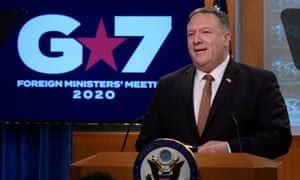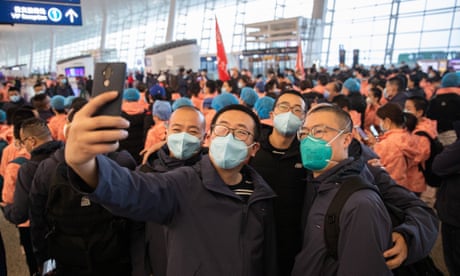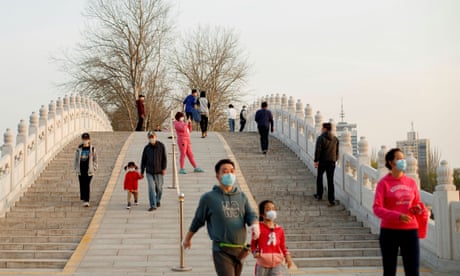Julian Borger
 When the UN security council and the G7 group sought to agree a global response to the coronavirus pandemic, the efforts stumbled on the US insistence on describing the threat as distinctively Chinese.
When the UN security council and the G7 group sought to agree a global response to the coronavirus pandemic, the efforts stumbled on the US insistence on describing the threat as distinctively Chinese.
There are other reasons for the lack of collaboration in the face of a global crisis, but the focus on labelling the virus Chinese and blaming China pursued by the US secretary of state, Mike Pompeo, helped ensure there would be no meaningful collective response from the world’s most powerful nations.
For some US allies, the fixation on words at a time when the international order was arguably facing its greatest challenge since the second world war encapsulated the glaring absence of US leadership.
And that absence was illustrated just as vividly by news coverage of planes full of medical supplies from China arriving in Italy, at a time when the US was quietly flying in half a million Italian-made diagnostic swabs for use in its own under-equipped health system and Donald Trump was on the phone to the South Korean president pressing him to send test kits.
Coronavirus: the week explained - sign up for our email newsletter
“To me what is so striking is the complete absence of the US from public debates. The US is basically off the map, and China very much is on the map,” Nathalie Tocci, the director of the Italian Institute for International Affairs and a former EU policy adviser, said.
“Whatever happens in the US elections, what is happening now is going to linger on, simply because what we’re going through now is such a traumatic experience … It is going to remain very much in our individual and collective memories.”
During the Ebola outbreak that began in 2014, the US was a highly visible leading presence on the ground in West Africa, sending emergency medics, troops and supplies. In sharp contrast, this week’s $2tn stimulus bill contained scarcely more than $1bn (about 0.06%) for spending outside the US.
The state department pointed out that the US was separately spending $274m in emergency health and humanitarian assistance to help countries in need, on top of the funding to international organisations like the WHO.
However, at a time when the scale of the damage is being measured in trillions, the additional aid has done little to soften the image of an administration that has employed xenophobic rhetoric and breaking with its closest partners in its efforts to intensify economic pressure on its enemies, Iran and Venezuela, whose populations are at high risk from the coronavirus.

China sends doctors and masks overseas as domestic coronavirus infections drop
Despite its responsibility for allowing the virus to run rampant in the first place, China has had notable success in reshaping its image as a leader by its later efforts to contain the disease and its outreach to Italy and other vulnerable countries.
“US global leadership won’t just end because they bungled their response to the coronavirus, but I think we will come to find that this was a pivotal point,” said Elisabeth Braw, the director of the Modern Deterrence Project at the Royal United Service Institute in London.
Braw argued that the coronavirus crisis will inflict more lasting damage on the US’s standing than the 2003 Iraq invasion.
“China wasn’t in the wings in 2003,” she said. “It wasn’t ready to take over that global role. Well, it’s now in a position where it can take over global leadership, and it’s just waiting for the US to misstep or to lose support among its allies … And the past couple of years have really been beneficial to China from that perspective.”
From the debacle over testing to Trump’s months-long denial about the scale of the threat and his constant political point-scoring, the US has showed itself to be anything but a model for the rest of the world to emulate.
Stephen Walt, a Harvard University professor of international relations, has argued that worldwide faith in US competence has been one of the pillars of its global standing, and is currently crumbling.
“Far from making ‘America great again,’ this epic policy failure will further tarnish the United States’ reputation as a country that knows how to do things effectively,” Walt wrote in Foreign Policy, in a commentary titled “the death of American competence”.
Not all global analysts look at the coronavirus as being so irreversibly negative for US standing in the world, pointing to more long-term trends, like US self-sufficiency in energy and its enduring economic, military and democratic advantages, as well China’s many shortcomings as a credible alternative global leader.
“Geopolitics are not episodic. You cannot talk about geopolitics in two-week timescales,” Parag Khanna, a former adviser to US forces who now runs a Singapore-based consulting company, FutureMap. “The power dynamics are what are fundamental, not whether or not China is sending lots of face masks to Africa.”
Khanna pointed out that China’s neighbours in Asia are well aware that Beijing’s censorship during the initial outbreak in Wuhan resulted in a missed opportunity to contain the virus, and that its diplomats have been spreading conspiracy theories about the origins of the disease.

Life after lockdown: has China really beaten coronavirus?
“China is filling a public goods vacuum, not a leadership vacuum,” Khanna said. “People here are not idiots. They know exactly where this came from, so you don’t need to worry about China winning any global narrative campaign in the world.”
Tocci argued that the extent to which China succeeds in exploiting the crisis to pursue global primacy would be dependent on whether Beijing can be successfully challenged, for example from a change to a more outward leadership in Washington, or a Europe that can transcend its divisions.
“It basically depends on how everyone else reacts more than how China itself acts,” Tocci said.
Since you're here...
… we’re asking readers like you to make a contribution in support of our open, independent journalism. Trusted news has never mattered more. In these frightening and uncertain times, millions of readers are turning to us for expertise, scientific knowledge and careful judgment, and we need your support to continue this vital work. No matter how unpredictable the future feels, we will remain with you, delivering high quality reporting so we can all make critical decisions about our lives, health and security. Together we can find a way through this.
You’ve read 5 articles in the last four months. We believe every one of us deserves equal access to accurate news and calm explanation. So, unlike many others, we made a different choice: to keep Guardian journalism open for all, regardless of where they live or what they can afford to pay. This would not be possible without the generosity of readers, who now support our work from 180 countries around the world.
We have upheld our editorial independence in the face of the disintegration of traditional media – with social platforms giving rise to misinformation, the seemingly unstoppable rise of big tech and independent voices being squashed by commercial ownership. The Guardian’s independence means we can set our own agenda and voice our own opinions. Our journalism is free from commercial and political bias – never influenced by billionaire owners or shareholders. This makes us different. It means we can challenge the powerful without fear and give a voice to those less heard.
Your financial support has meant we can keep investigating, disentangling and interrogating. It has protected our independence, which has never been so critical. We are so grateful.
No comments:
Post a Comment